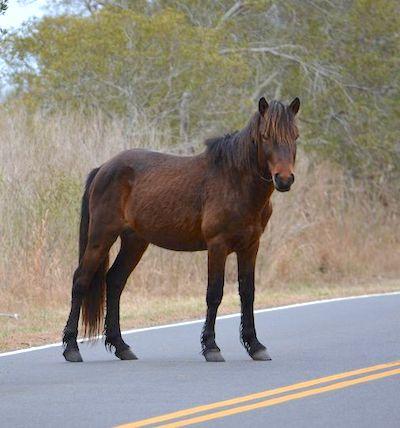
Delegate's Pride, an aggressive stallion, has been removed from Assateague Island National Seashore/NPS
A stallion that got too used to human handouts and became aggressive in his pursuit of them has been moved from Assateague Island National Seashore in Maryland to a wildlife sanctuary in Texas.
Park staff say the stallion N6ELS-H (aka Delegate's Pride and Chip) was removed from the seashore on Monday because he was getting increasingly aggressive towards park visitors and staff when pursuing human food or when park staff attempted to redirect him or his band away from crowded visitor use areas such as campgrounds and parking areas.
Since 2017 this horse has been involved in more than 50 percent of all incidents which have resulted in injury to visitors, a park release noted. He is also extremely resistance to non-contact methods used by park staff to move horses out of potentially dangerous situations-totally ignoring actions that prompt other horses to move. For these reasons, Delegate’s Pride was shipped from Assateague Island to the Cleveland Amory Black Beauty Ranch in Murchison, Texas, a renowned wildlife sanctuary.
Certain individual horses (and bands) in the Maryland herd are continuing to learn to associate humans with food rewards. Habituated – or unafraid - horses can easily become food conditioned when they receive food from visitors, both intentionally and unintentionally through improper food storage. Unfortunately, reversing behavior once a wild animal has learned to associate people with food is extremely difficult. Removal often becomes the only option to manage a highly food conditioned animal, especially one causing the majority of negative and dangerous interactions with the public.
Updated food storage regulations for Assateague Island campers will soon be included in the Superintendent’s Compendium dated May 2022. Campers can only store food in a vehicle or in a strapped cooler placed inside the food storage box provided by the Park Service under all picnic tables. Assateague Island National Seashore replaced all picnic tables in the fall of 2019 with tables specifically designed with horse-proof food storage compartments to hold standard-sized strapped coolers and hard-sided containers.
“All visitors need to take this food storage issue seriously and help us reduce the frequency of inappropriate interactions with the wild horses,” said Seashore Superintendent Hugh Hawthorne. “The free roaming nature of the Assateague horses is what makes them so unique and special, but there are also issues like this that need to be addressed.”
Assateague Island National Seashore is urging all visitors to take a proactive role in protecting the wild horses by complying with all rules and regulations. Always maintain a safe distance from horses (over 40 feet or a “bus length”), never feed wildlife (this includes the wild horses, and includes baiting the horses with food or leaving food for the horses), and follow proper food storage regulations.
Every visitor shares the responsibility and can help prevent the wild horses from becoming food conditioned and developing dangerous behavioral changes that could result in removal from the herd and their island home.

 Support Essential Coverage of Essential Places
Support Essential Coverage of Essential Places



